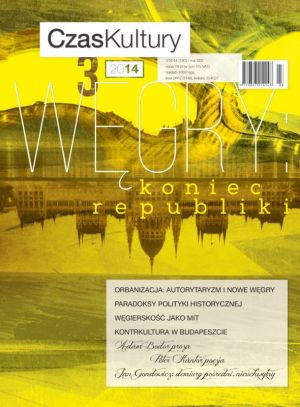Anielski naród
An angelic nation
Author(s): Miklós SzabóSubject(s): Recent History (1900 till today), History of Antisemitism
Published by: Stowarzyszenie Czasu Kultury
Keywords: Hungarian revisionism; memory of Holocaust; Miklós Horthy;
Summary/Abstract: Some might say that there seems to be a rising tendency toward historical revisionism in Hungary. The term “revisionism” is used here to describe a negative process, a reinvention, a reinterpretation of historical events in a way that constitutes the denial of historical crimes. This would be an arguably objective statement, but on its own would also create a false certitude that we are facing a simple case of misinterpretation – something that can be addressed and solved by historians, the bearers of objective knowledge, a simple lie that shatters in the light of truth. If existence, as Heidegger claimed, “finds it’s meaning in temporality”, then we can assume that the present is in fact the history of itself, and all social phenomena are questions about the present, and therefore something that is naturally immune to the charms of historical facts. In this case, it can only be fully understood through an anthropological analysis, since historical facts are nonexistent, or at least irrelevant, from this perspective. If we also assume that we all live in “imagined communities”, and can analyze the “cultural stuff” that forms the basis of one’s national, ethnic, or any other group-related identity, then we can discard any observable social events, for it would be easier to label them simply as the product of mere stupidity or a misinterpretation of facts.This ternary can be understood through an analysis of recent Hungarian events, like the scandal concerning a statue presently under construction on Freedom Square (Budapest) that commemorates the Nazi invasion of 1944 and the rehabilitation of Miklós Horthy, the war-time leader of Hungary. The statue portrays Hungary as a victim of the Nazis, while more than 430,000 Hungarian Jews were deported to Auschwitz in the summer of 1944, with the active help of Hungarian officials. Nostalgia toward the 1930s goes hand-in-hand with increasing xenophobia and racism. These resent events can be, and are, criticized from a number of perspectives, without any effect, proving again that one should first understand an issue before addressing it.
Journal: Czas Kultury
- Issue Year: XXX/2014
- Issue No: 03
- Page Range: 42-51
- Page Count: 10
- Language: Polish
- Content File-PDF

